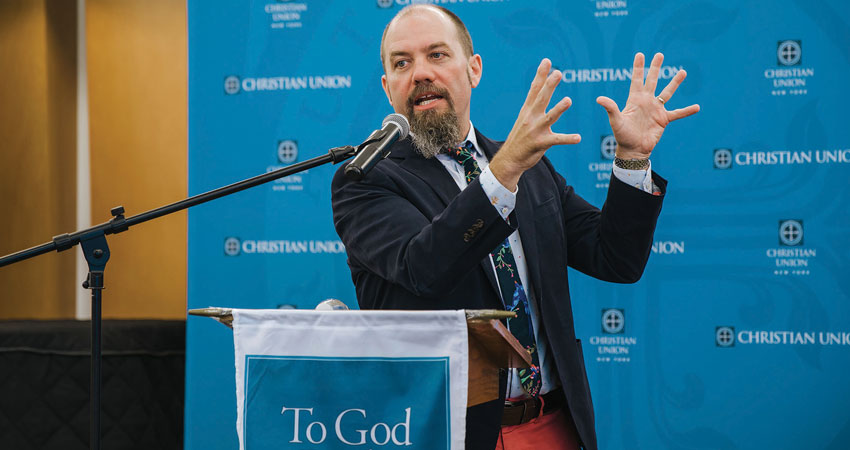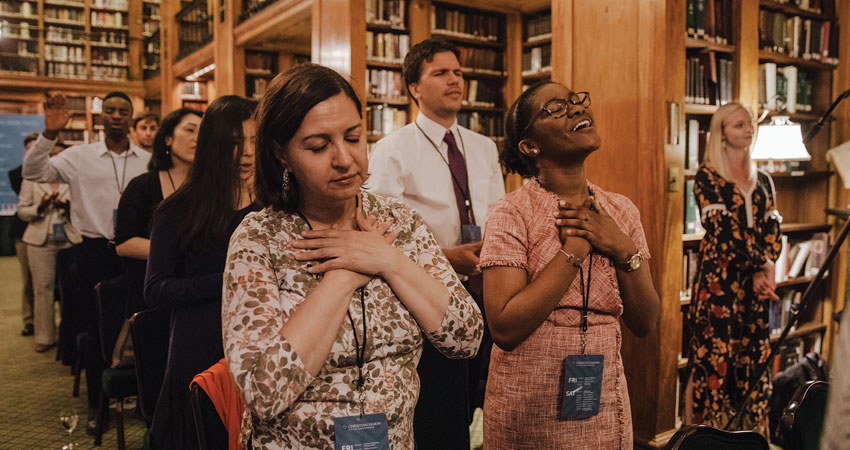Cities Conference Features James K.A. Smith, Vince Vitale
by catherine elvy, staff writer
At the Christian Union Cities Conference, scholar James K.A. Smith challenged young professionals to reflect upon whether they are pursuing faithful service or self-serving aggrandizement. Ambitions can propel believers to fulfill spiritual callings or throttle them into idolatrous practices, he said.

Scholar and author James K.A. Smith encouraged young professionals to consider the motives behind their careers and personal ambitions during the Christian Union Cities Conference.
Such insights illuminated the conference’s theme entitled Courageous in the Ways of the Lord. Held on June 21 and 22 in Manhattan, the event attracted alumni from top universities and young professionals from New York City and other metro areas. Plenary and breakout sessions emphasized topics related to faith and work, plus the conference allocated generous time for worship, prayer, and networking.
At a plenary session, Smith encouraged young professionals to consider motivations behind their ambitions.
“It is the goal or end that distinguishes good from bad ambition,” said Smith, a philosopher at Calvin College. “What are we looking for in our ambition? We live in an age where everybody is famous or hopes to be so. They are living for the hope of going viral.”
Scott Crosby, ministry director of Christian Union Cities, said the conference readily instructed and motivated young adults on ways to live out faith in the public square, despite cultural trends that erode biblical values. Crosby oversees Bible Courses, mentoring and networking opportunities, forums, and other enriching events tailored to professionals and graduate students in New York and Washington, D.C.
Other plenary speakers for the June conference included: Vince Vitale (Princeton ’04), regional director for the Americas with Ravi Zacharias International Ministries, and Adrian Mullings (Princeton ’04), an executive coach, consultant, and entrepreneur. Breakout sessions dove into a variety of topics, including the interface between spirituality and mental and physical health; ways to listen to God while serving in leadership; and tools to deploy readily to reflect God’s kingdom in workplace settings.
Amanda Curtis, an intern with Christian Union New York, described the teachings as highly applicable to emerging professionals. “The ability to process our faith thoughtfully is part of the beauty in being created with free will and a huge part of God’s desire for us to seek Him,” said Curtis, Cornell ’19.
At times, “we can get stuck in our minds trying to understand deep theological questions to the point where we really struggle to engage with the world and other communities,” she said. “Each of these talks provided action steps and approaches for realigning our priorities, serving the Lord in our professions, and loving those around us as God would.”
Smith, editor in chief of Image journal, spoke about Augustine of Hippo, including how the ancient church father, better known as St. Augustine, served as a model for what he terms “sanctified ambition.”
Smith’s newest book, On the Road with Saint Augustine: A Real-World Spirituality for Restless Hearts, releases in October. He described Augustine as “kind of like a Manhattanite about 1,500 years before Manhattan. He’s basically like a lot of people you hang out with.”
Smith told conference goers to weigh the nature of their ambitions. He also warned the audience that the opposite of ambition is not humility. Rather, it is passivity, timidity, compliancy, and sloth. Individuals can be ambitious and humble, or they can be ambitious and arrogant.
“Ambition can become a form of idolatry. It’s lowering our sights. How many ‘likes’ are enough? How many followers are enough?” Smith asked rhetorically. “What if we’re not wired to be liked, but to be loved by the One who made us?”
This year’s theme centered upon 2 Chronicles 17:6, which showcased how King Jehoshaphat’s “heart was courageous in the ways of the Lord.”
Among other plenary speakers, Mullings encouraged Christian professionals to use biblical perspectives as they evaluate their lives and career endeavors. The former Princeton sprinter and record-setting hurdler cautioned young professionals against falling back upon worldly value systems and metrics.
In his plenary session, Vitale explained how evangelism, at its core, simply involves asking associates and neighbors to trust an infinite God who actively reveals His divine nature.
When it comes to evangelism, simple invitations can be incredibly effective, powerful tools. Vitale also highlighted how the Lord orchestrates circumstances and creation to draw individuals to Himself, a reference to Acts 17:27.
“Every time we step into conversation, God already has been revealing Himself,” said Vitale. “How many people do we walk by every day who just need an invitation?”
In addition, Vitale warned them to avoid purely intellectual debates when sharing their faith. Rather, they should prompt listeners to ponder life’s bigger questions, especially ones regarding origin, meaning, morality, and destiny. Such topics can promote deep discussions on worldviews, human satisfaction, and eternal destinies.
As they engage with peers and strangers, believers should realize that salvation truly could be at hand. Often an offer can be as simple as: “Would you like to join me in the Christian life?”
Just like the biblical example of King Jehoshaphat, modern believers are called to showcase spiritual courage and devotion, in witnessing and in everyday life.
Such practices dovetail with some of the key values of Christian Union, especially ones to encourage young professionals to honor the Lord, step out in faith, and change the world.





